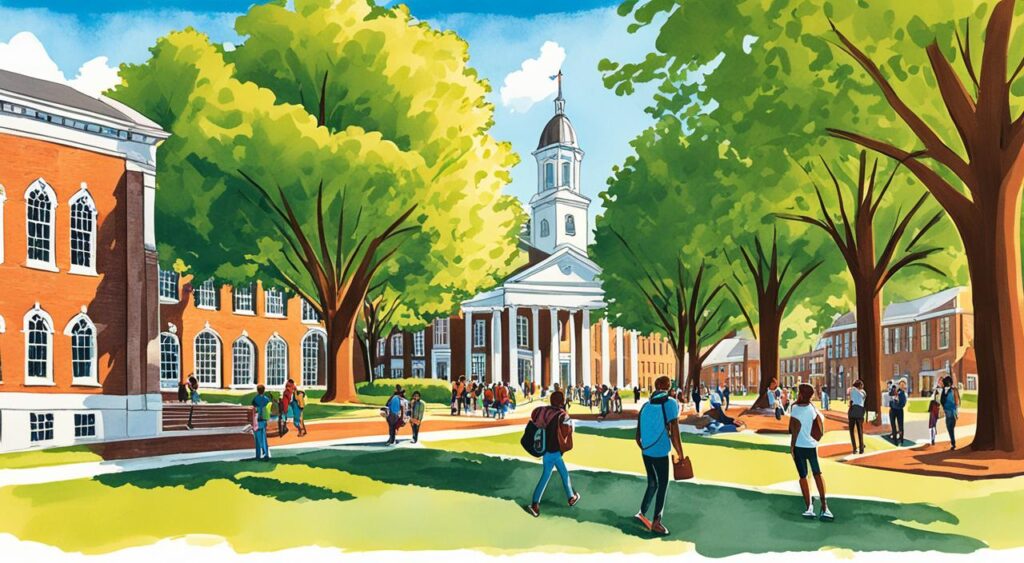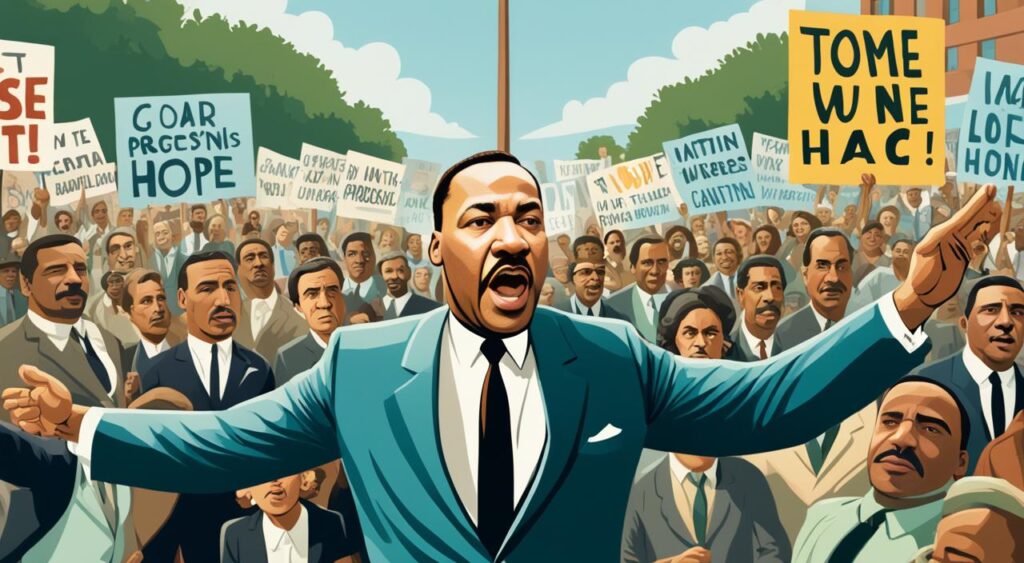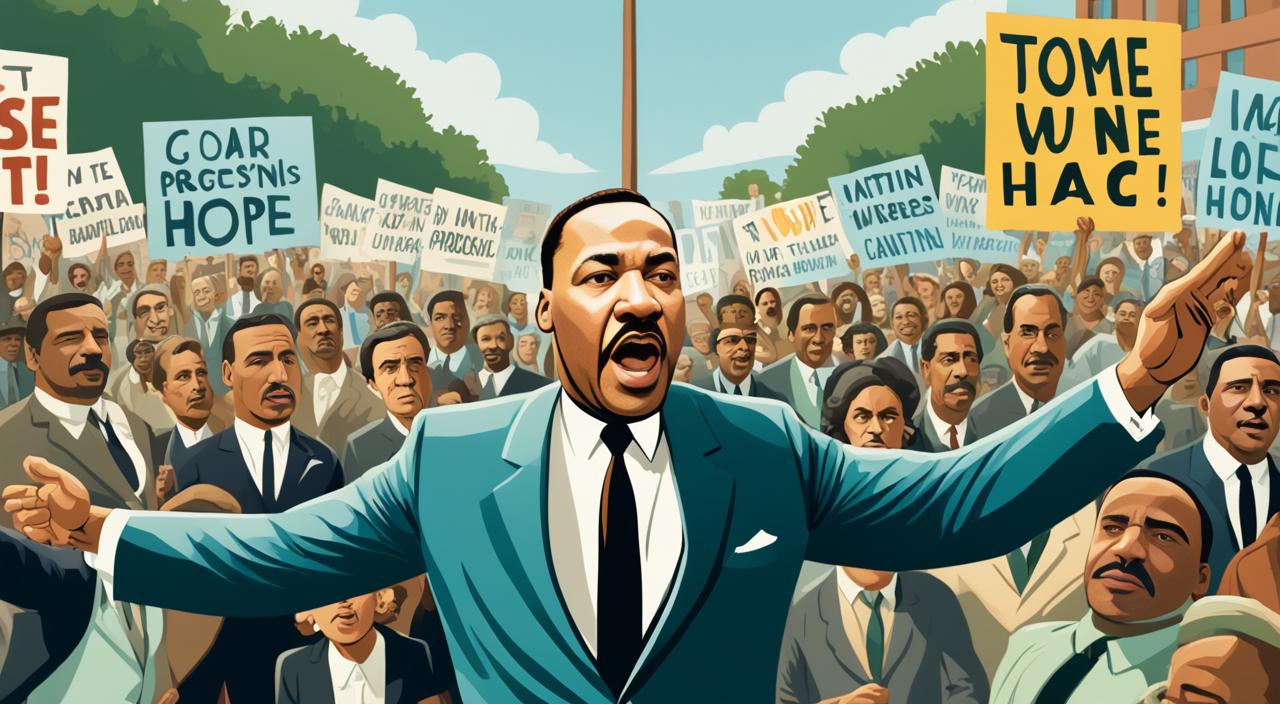When we think of American history, few are as big as Martin Luther King Jr. He fought hard for civil rights. King used nonviolent ways and his strong voice. He helped end the racial separation that hurt America for so long.
He was born in Atlanta, Georgia, in 1929. As a kid, he saw a lot of racism. But he didn’t let it stop him. He worked hard for fairness for all. His work started big changes, from leading boycotts to making great speeches.
Key Takeaways
- Martin Luther King Jr. was a Baptist minister and civil rights activist who played a pivotal role in ending legal segregation of African Americans.
- He was instrumental in the creation of the Civil Rights Act of 1964 and the Voting Rights Act of 1965, two landmark pieces of civil rights legislation.
- King’s nonviolent activism and inspirational speeches, most notably his famous “I Have a Dream” speech, made him a central figure in the civil rights movement.
- He was awarded the Nobel Peace Prize in 1964 and is widely regarded as one of the most influential and inspirational African American leaders in history.
- King’s legacy continues to inspire people around the world, and his birthday is celebrated as a national holiday in the United States.
Early Life and Family Background
Michael Luther King Jr., later known as Martin, was born in 1929 in Atlanta, Georgia. He came from a family of Baptist preachers and civil rights fighters. His parents taught him to stand against racial prejudice and segregation, setting a strong direction for his life.
His mother’s father, A.D. Williams, led the Ebenezer Baptist Church. It was a key place for African Americans in Atlanta. King learned a lot about helping others and fighting for justice from this church and his family.
Birth and Childhood in Atlanta
Martin Luther King Jr. was born on January 15, 1929. He grew up in a warm and safe home. But, he also saw the struggles caused by segregation. These early experiences led him to work for civil rights.
Influence of His Father and Grandfather
King’s father, Martin Luther King Sr., was a Baptist minister. He fought for equality, just like his son did. His work inspired Martin to fight against racism.
Martin also looked up to his grandfather, A.D. Williams. As a leader at Ebenezer Baptist Church, Williams helped shape the community. He showed Martin how important the church could be in helping others.
“Darkness cannot drive out darkness; only light can do that. Hate cannot drive out hate; only love can do that.”
– Martin Luther King Jr.
Education and Spiritual Awakening
Martin Luther King Jr. was an inspiring figure whose education and spiritual journey were key in forming his legacy. He grew up in Atlanta, Georgia, beginning at Morehouse College when he was 15. At first, he didn’t feel motivated but soon started to care about issues like politics and society. This passion led him to think about becoming a social activist in the future.
During college, King’s faith changed a lot. He wasn’t sure about becoming a minister at first but later on, he felt a calling. He became a minister at Ebenezer Baptist Church in 1948. This was a big step in his spiritual journey, which later inspired his work in civil rights.
Studies at Morehouse College
Being at Morehouse College made a huge impact on King. Mays, a famous theologian and civil rights leader, was his teacher. Through Mays, King learned how faith and social justice go together.
Crozer Theological Seminary and Boston University
Next, King went to Crozer Theological Seminary in Pennsylvania, where he did very well. There, he learned about Gandhi’s ideas of nonviolent protest. King would later use these ideas in the civil rights movement. After Crozer, he earned his doctorate at Boston University in 1955.
King’s time in school wasn’t just about studying. It was about shaping his beliefs in theology, justice, and peaceful protest. These lessons were key to his remarkable work for civil rights and his important legacy of fighting for equality and dignity.

| Institution | Degree/Program | Year |
|---|---|---|
| Morehouse College | Undergraduate | 1948 |
| Crozer Theological Seminary | Theology | 1951 |
| Boston University | Doctorate in Theology | 1955 |
Philosophy of Nonviolence and Civil Disobedience
Martin Luther King Jr. felt deeply about nonviolent activism. This belief was key in his fight for civil rights. During college, he learned about nonviolent resistance from Henry David Thoreau’s essay “On Civil Disobedience.” This text helped shape King’s thoughts on peaceful protest.
Later, at Crozer Theological Seminary, King found inspiration in Mahatma Gandhi. A talk by Dr. Mordecai Johnson about Gandhi’s work moved King. He then focused on Gandhi’s nonviolent methods, which he called a “pilgrimage to nonviolence.”
Bayard Rustin, a friend of King’s, also taught King about using nonviolence. Rustin shared Gandhi’s teachings with King. He advised King to follow six principles of nonviolence. These included fighting evil acts peacefully and making friends with enemies.
King believed in a peaceful world, calling it the “Beloved Community.” He thought nonviolence could change society for the better. He worked hard for justice, equality, and peace, using peaceful methods.
Even when others in the civil rights movement turned to violence, King stayed true. He knew that modern weapons made fighting hard. So, he chose peace over fighting. King believed nonviolence could change the world for the better.
Martin Luther King Jr. Biography

Martin Luther King Jr. is a key figure in the civil rights movement. He used peaceful ways to fight for equal rights. In 1955, he led the Montgomery bus boycott. It lasted over a year and made him known worldwide.
King also helped start the Southern Christian Leadership Conference (SCLC). This group used peaceful methods, like in the 1963 March on Washington. There, King shared his famous “I Have a Dream” speech.
His work led to big changes, like the Civil Rights Act of 1964. He also won the Nobel Peace Prize. Sadly, King was killed in 1968, but his fight for justice lives on.
Martin Luther King Jr. still inspires people worldwide. His dream was for a fair and just world for everyone. We celebrate his life and remember his impact on civil rights.
Martin Luther King Jr.’s powerful speeches and unwavering commitment to equality resonated with many social justice advocates, like Susan B. Anthony (Susan B. Anthony Biography), who fought for women’s suffrage in the 19th century.
FAQ
Who was Martin Luther King Jr.?
Martin Luther King Jr. was a Baptist minister and civil rights activist. He had a big effect on the US from the mid-1950s to 1968. King helped end the segregation of African Americans. He was key in creating the Civil Rights Act of 1964 and the Voting Rights Act of 1965.
What were some of Martin Luther King Jr.’s key achievements?
King used nonviolent ways to fight for rights. His “I Have a Dream” speech is famous. In 1964, he won the Nobel Peace Prize. King is known as a very important African American leader in history.
What was Martin Luther King Jr.’s early life and family background like?
King was born in 1929 in Atlanta, Georgia. His parents were strong church leaders. They influenced King to fight against racial hate. King’s grandfather was also a powerful minister.
His father, Martin Luther King Sr., was a Baptist minister. He stood against racism and segregation. He inspired his son’s works for equality.
How did Martin Luther King Jr.’s education and spiritual journey shape his philosophy?
King first hesitated to enter the ministry. But, he later followed his faith, becoming ordained. He learned about nonviolence at a college. Gandhi’s ideas deeply affected King.
After excelling at Crozer Theological Seminary, King earned his doctorate. His studies shaped his philosophy. He believed in peaceful ways to make the world better.
What was Martin Luther King Jr.’s philosophy of nonviolence and civil disobedience?
King learned about nonviolence from Thoreau’s writings. Gandhi’s work on peaceful protest also inspired him. King thought peaceful action was the best way to fight wrongs.
He had six principles for nonviolence. He aimed for a world without racism, poverty, and violence. He called this the “Beloved Community.” His dream was to see everyone living together in peace.
What were some of Martin Luther King Jr.’s key contributions to the civil rights movement?
In 1955, King led the successful Montgomery bus boycott. It lasted over a year. This made him a national civil rights leader. He later started the SCLC, which led peaceful protests.
The 1963 March on Washington was one of King’s big moments. There, he gave his famous speech. King’s efforts helped in passing laws that gave equal rights to everyone in the US.
